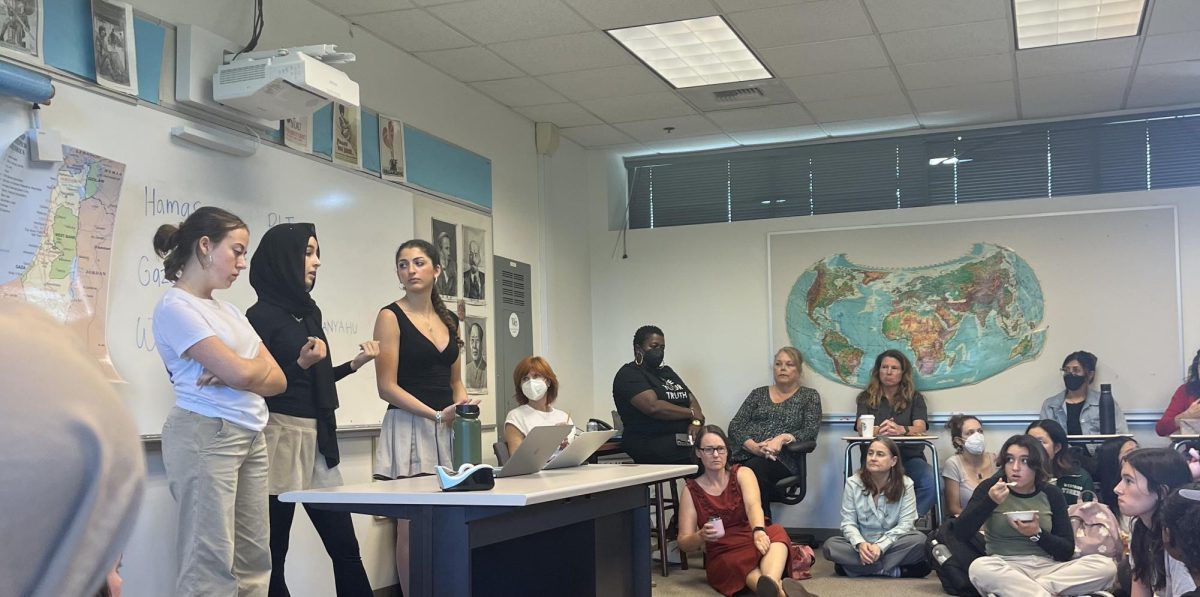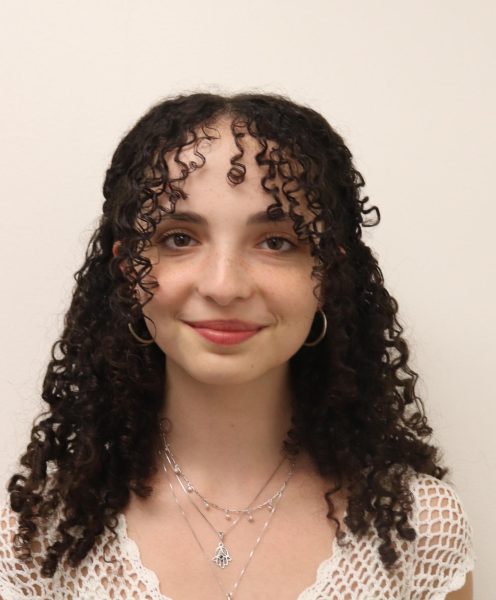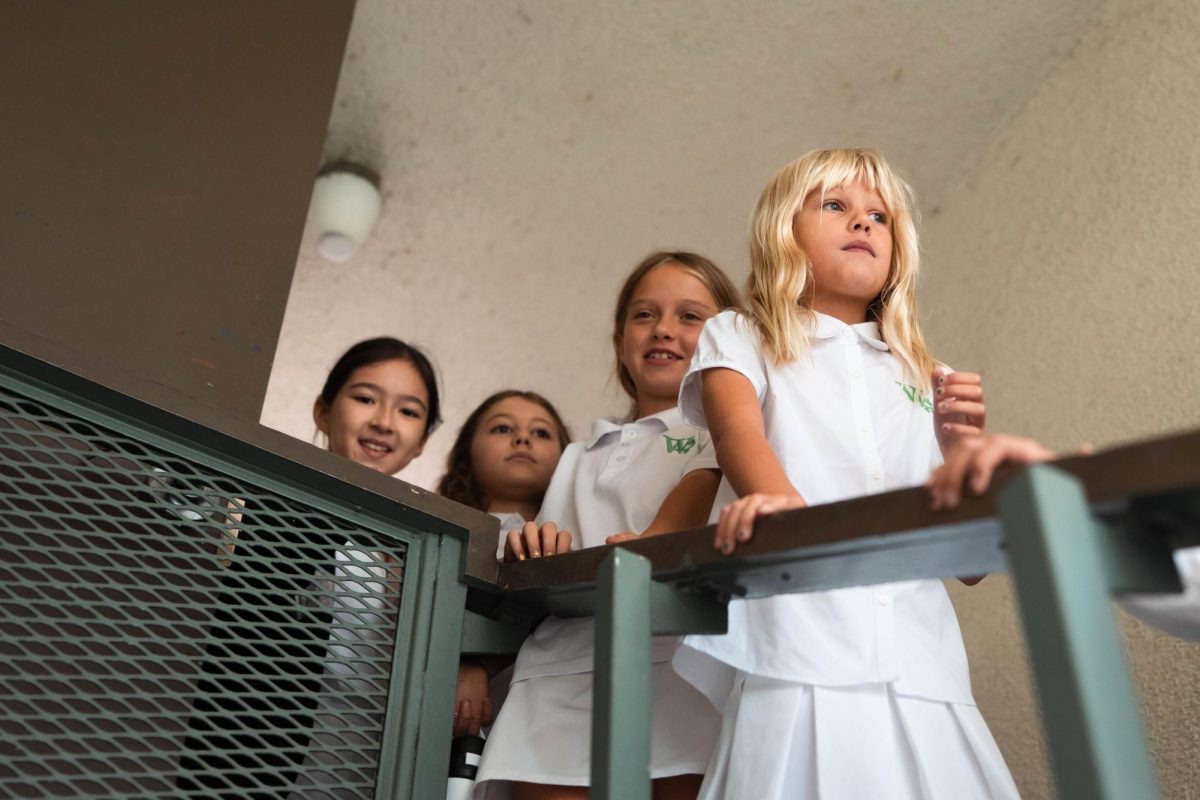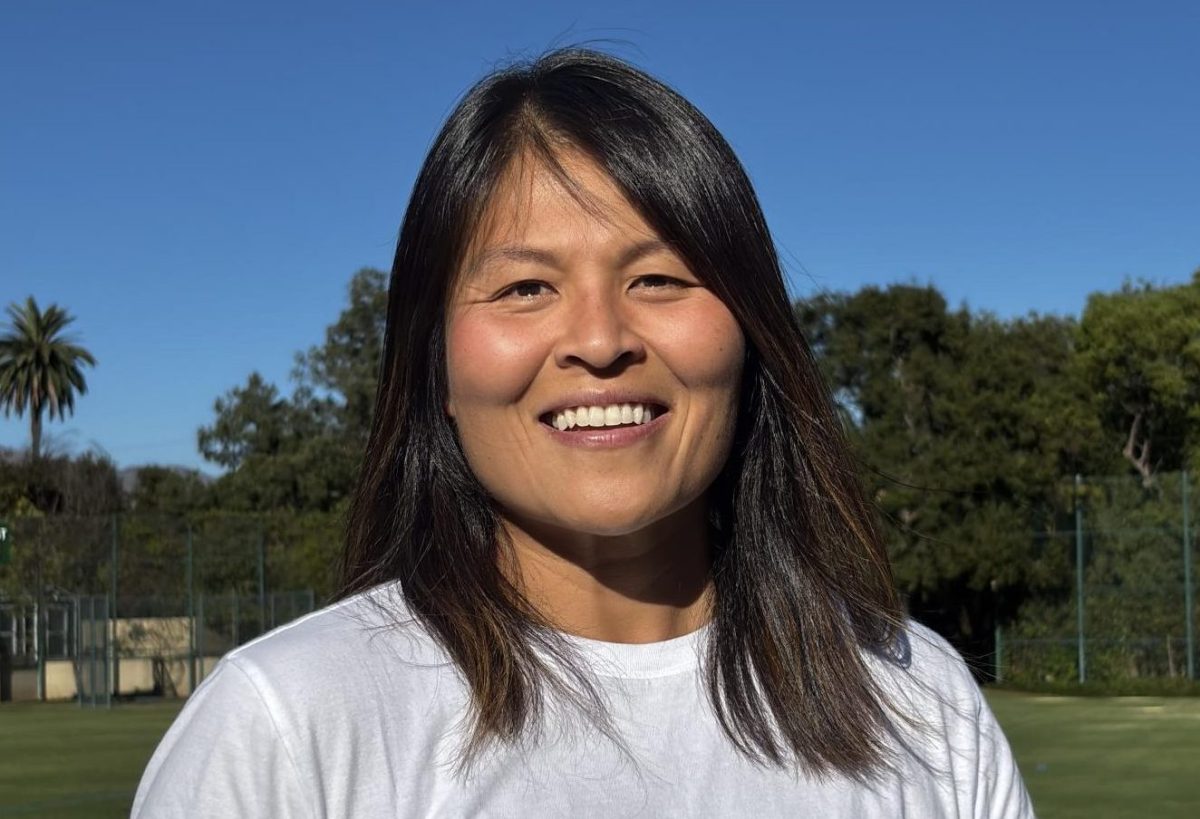On Wednesday, October 11, as Upper School students, teachers, and administrators packed themselves into the history classroom RB60, the scene was set to become a fire hazard. Consequently, most attendees, even teachers, sat down on the floor, legs criss-crossed, and squeezed their bodies tightly together, shoulder against shoulder. As more and more students arrived, the casual discussions of their last class and the lunch in front of them buzzed around the room.
Meanwhile, the three Middle Eastern and North African (MENA) Affinity heads stood anxiously in front of the whiteboard, their eyes occasionally darting from their notes to look around the room, then to the clock, then back to their notes. At 1:25 p.m., they eventually called out for everyone’s attention, and the sounds of trivial lunchtime chats quickly ceased, leaving the room near silent. It was time to discuss Hamas’ attack on Israel the Saturday prior.
“It was definitely a conversation that we were having on campus and I think that as heads, we wanted to bring that to a space that was meant for that rather than just a conversation that was floating around,” Daria H. ’24, a head of the Middle Eastern and North African Affinity (MENA) and a Spyglass editor, said.
This discussion would become one of the first actions and steps toward educating and holding space for the Westridge community in regard to the Israel-Hamas War.
Earlier that week, on Monday, October 9, Westridge sent an email to students acknowledging the conflict on Saturday, October 7 and offering space for students to speak with school counselors. Westridge sent an additional follow-up email to parents later that day informing them of how the school was supporting students during this time.
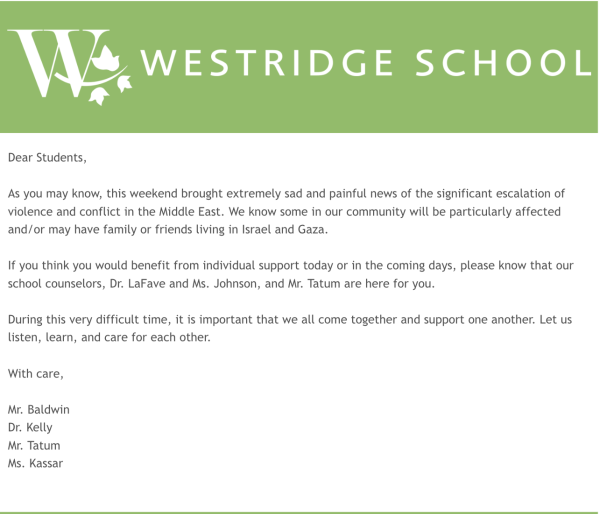
Head of School Ms. Andrea Kassar further explained the intention behind the letter: “The letter focused on student support and our school’s commitment to inclusion and belonging, and reminding families that is something that we always care deeply about, and that the wellness of our students is a priority. We may not be able to control the world outside Westridge unfortunately, but we strive to support our students here always, but especially in very difficult times.”
But many students, especially those with more personal ties to the Middle East, were left unsatisfied with the contents of the email sent out. “To a certain extent, it’s the school’s responsibility to both say that we have the support system for you if you want to talk, but we also have these resources of education, where you can learn as well,” Saba K. ’25, another MENA head, said.
Her fellow affinity heads, Daria and Noa K. ’24 reaffirmed that a list of educational resources would have been a constructive addition to the email.
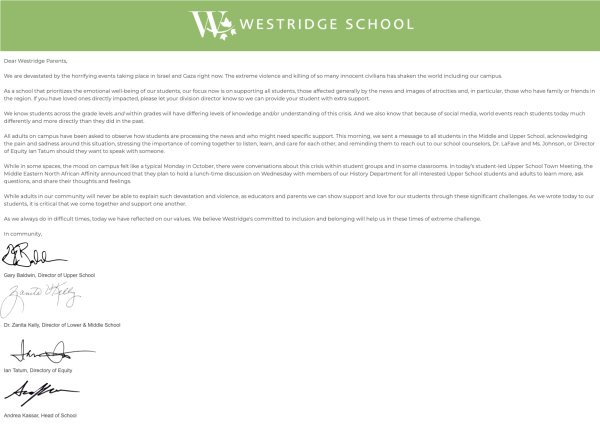
But even before the school sent out the email, the MENA heads quickly recognized that the issue would likely require further discussion and education. They contacted Ms. Sandy de Grijs, an Upper School History teacher who teaches Westridge’s Modern Middle East class, to inform her of their hope to host a discussion to process the conflict within the Westridge community.
When given the go-ahead, the MENA heads proceeded to make very intentional choices regarding the invitees, the location, and the subjects of the meeting due to the emotional weight and the complicated history of the conflict. Ultimately, they decided on an optional lunchtime gathering open to faculty, administrators, and Upper School students. The meeting would be hosted in RB60, the Modern Middle East classroom, rather than a larger outdoor space in the hope of fostering a feeling of solidarity and intimacy.
The meeting began with the MENA heads establishing community norms to hold a productive and sensitive conversation. Afterwards, they briefly defined the terms Hamas, Gaza/Gaza Strip, PIJ (Palestinian Islamic Jihad), PA (Palestinian Authority), and West Bank.
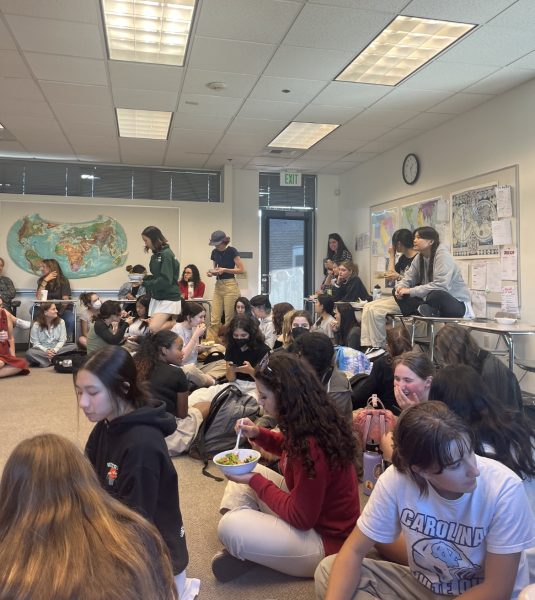
“I think in terms of the intention that we wanted to set, we really wanted to focus it around education, information, and then also support, just because it is such a complicated issue. It felt like it was impossible to talk about every single little detail, but rather to just focus on what’s happening most recently, and how can we support the community around us in processing and understanding this information?” Daria said.
After solidifying the basics of the conflict, the MENA heads opened up the conversation to all attendees for questions, testimonies, or comments.
Many who shared had a personal connection to the recent events. Alex S. ’24, who noted she had both family and close friends in Israel, stated her struggles in reacting to the event more emotionally than intellectually. Micah M. ’25, a head of Jewish Affinity, used the space to share words from her rabbi. Sophie C. ’25 raised questions about the role social media played in the general public’s understanding of the conflict.
By the end of the meeting, many students as well as faculty and administrators were teary-eyed, and as the classroom emptied, teachers and students hugged and consoled each other.
“[The MENA heads] held such a thoughtful and inclusive conversation on every level with fellow students who chose to attend… That is not an easy thing to do, and especially on such a devastating and challenging topic. And to be honest, after the conversation, I welled up. I think that some of the students saw that we were all welling up, many of us. But really what I was welling up with was pride, pride in our students,” Ms. Kassar said.
While in the past, Westridge has often responded to global issues in the form of mandatory-attendance town meetings, Saba shared why that format didn’t necessarily suit the MENA heads’ approach. “Having a required meeting would have had a different sort of impact. I think it would have spread the information we were presenting more, but it wouldn’t have created that same sort of support space where people could just talk out,” she said.
“Given what had happened and the time they had, I think [The MENA heads] did very well,” Tessie J. ’24, who attended the meeting, said.
And while the event itself was largely successful, the task of independently organizing and leading this meeting left the MENA heads feeling slightly burdened.
Regarding speaking at and hosting the meeting, Noa, who has many family members living in Israel, said, “I did want to say something and I knew that I’d be frustrated with myself if I kept quiet because this issue affects me so deeply that I wouldn’t want to be complicit in sweeping it under the rug, which I think is how a lot of us felt. But at the end of the day, I truly was thinking about the fact that it shouldn’t have been our responsibility to email teachers, to email the school, to go up during Town Meeting and say, ‘Hey, we’re doing this at lunch.’ That shouldn’t have been our responsibility. But it was, and I think that that was hurtful.”
“We’re still kids; we still need support,” Saba agreed, sharing a similar sentiment to Noa.
Additionally, the heads expressed dissatisfaction with the school’s further response, or lack of response, to the conflict in the ongoing days. “It’s just frustrating that the community’s response hasn’t been updated and hasn’t been further elaborated on. A lot of us are still grieving, a lot of us are still nervous for what’s to come,” Noa said.
In the weeks following the MENA-led discussion, the administration met with the MENA and Jewish Affinity heads three separate times to discuss how the school could be more supportive of their students. At the second meeting, the heads as well as Ms. Kassar, Director of Upper School Mr. Gary Baldwin, Director of Equity Mr. Ian Tatum, and members of the history department agreed to host a community gathering, which will be held on November 13. They additionally agreed to help MENA affinity heads host a series of lunchtime discussions, similar to the one hosted originally.
Although constructive changes are being made, the school’s initial handling of the conflict has left many still very hurt and disappointed. “My instinct in the aftermath of October 7th was to cling to community. My family, my synagogue, my friends and their families. As an affinity head it took me a second to react in the Westridge space. It wasn’t being discussed on campus or by administration except for MENA’s presentation and an email to parents. It didn’t feel like I could react, or grieve, or even speak out at Westridge. I wanted a vigil, a moment of silence to reckon with the death and horrors that so many people were suffering from, but I was disappointed to see my school stay silent,” Micah said.




























![Dr. Zanita Kelly, Director of Lower and Middle School, pictured above, and the rest of Westridge Administration were instrumental to providing Westridge faculty and staff the support they needed after the Eaton fire. "[Teachers] are part of the community," said Dr. Kelly. "Just like our families and students."](https://westridgespyglass.org/wp-content/uploads/2025/03/dr.-kellyyy-1-e1748143600809.png)






















